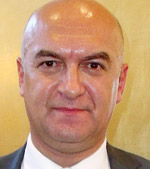“This is like a situation when you say at someone’s face directly that his mother is a bitch,” said Yavuz Baydar, journalist of the Turkish Zaman newspaper, concerning the Turkish policy of denying the fact of the Genocide during yesterday’s discussion organized at the Civilitas foundation. The Turkish journalist said that because of his political opinions he lived in Sweden for 16 years. In this country he wanted to study the issue of Curds but he was suggested to study the Armenian issue as it was the issue Turkey would face one day. Baydar says that the Turkish youth is interested in the issues of both Armenians and Curds because they understand that without finding a solution for these two issues they can’t move forward. The journalist says that currently the Turkish society is looking for ways to the solution. He also commented on the protocols to be signed by the parties and said that about 70% of the Turkish society is for the development of relations with Armenia. “I think that they don’t even know what is written in the protocols, but the psychologically understand that we need to develop relations. It is necessary to open not only the physical borders but the psychological ones too. But it is very difficult because many years people did not know the history,” said Baydar.
In his speech he used terms such as “black pages of the history”, “very bad things”, etc. when speaking of the genocide. He confessed and said that Turks had done very bad to Armenians and it seemed h was confessing and understanding what his ancestors had done. However he did not use the term “Genocide” anyway. In the end of the meeting we asked him why he had abstained from using this word. “It is clear to me that in 1941 by the resolution of the UN it was called genocide, I agree with it. 8000 people were killed in Bosnia, it is genocide too. The Armenian genocide is a genocide too. But the problem is not in the numbers how many people were killed but the pain people suffered. I am for sharing this pain of people. I attach more importance to the factor of pain than the genocide itself. I never use the word genocide even though I strongly believe that it was genocide. For me it is important to talk to people, to talk to Turks, to talk about the pain people suffered and human tragedy. When I speak the word genocide it does not say anything and closes the doors between us. This term is used so much in politics that it demolishes any prospects of dialogue. In my publications I always use the term Mets Yeghern, which itself means a great tragedy. I am trying to talk to people,” said the Turkish journalist. Whatever the Turkish journalist does, even if he condemns what his ancestors have done, we understand that he is a citizen of Turkey and it was not his wish only to visit Armenia. It would be naïve to think that people in his country did not know that he would express such opinions in Armenia. And not only in his country… In the end of the discussion we were informed that it had been organized in support of Norway. In other words, the visit of the Turkish journalist and his announcement fully correspond to the interests of the West in terms of developing relations between Armenia and Turkey. If yes, it is very strange that the discussion was organized by Vardan Oskanyan, who is the founder of the Civilitas foundation and is doing his best to criticize the Armenian-Turkish relations. To note, several days ago the Civilitas also sponsored the exhibition of postcards entitled “My beloved brother, Armenians in Turkey 100 years ago” in Moscow cinema house, which was later introduced as “Turkish propaganda”. “There is anti-Armenian propaganda in Armenia, Turkish propaganda, which is carried out by the former FM Vardan Oskanyan,” said historian Gevorg Yazanchyan. Vardan Oskanyan did not give a direct answer to our question whether this discussion and the invitation of the Turkish journalist was not the continuation of that propaganda. “The Civilitas and me have always advocated for dialogue, thus we believe that it is important to develop the Armenian-Turkish relations as a result of such dialogue but not fast decisions under pressure,” he said. Official of foreign ministry Ara Papyan said he did not think the words of the Turkish journalist were honest. He said that Baydar’s visit was a part of the Western project of reconciliation. “It was not by chance that the Norwegians gave money to hold this discussion. I would say that this process started months or years ago. They are giving money and instructing people to come and speak good things,” said Ara Papyan.

